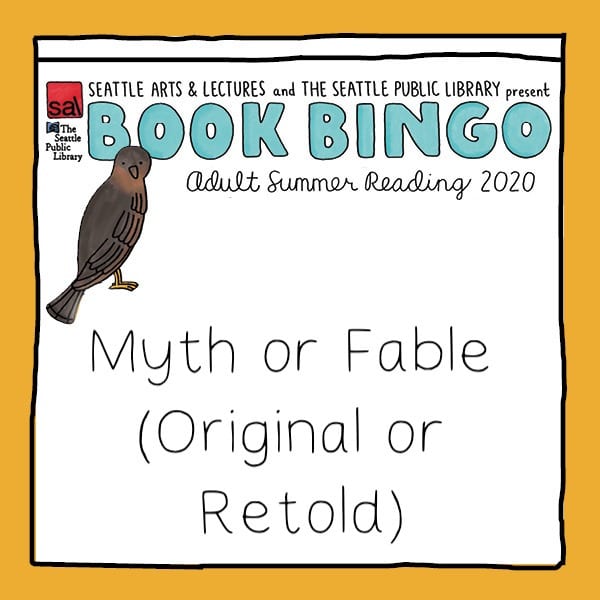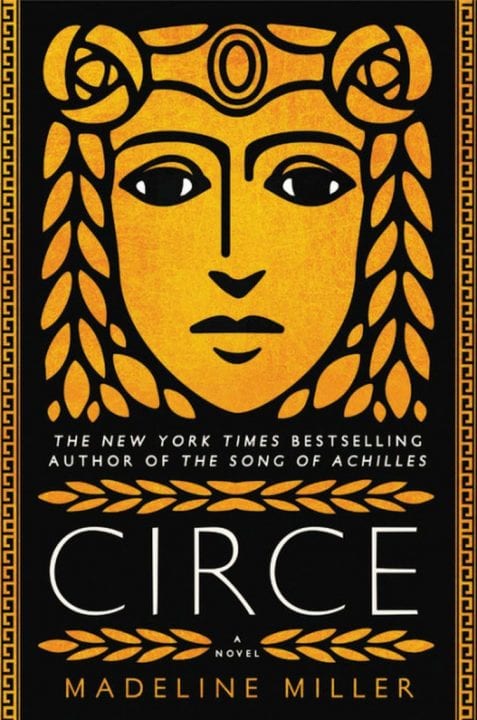
2020 Summer Book Bingo: Myth or Fable (Original or Retold)
July 22, 2020
We’re half way through summer, so it’s time to get serious about filling up our 2020 Summer Book Bingo cards. Summer Book Bingo is our free summer reading program with The Seattle Public Library! Download your card here. Engage with other bingo players and find out their own reading adventures by using the hashtag #BookBingoNW2020 on social media.
For some inspiration on what to read for the “Myth or Fable (Original or Retold)” category, SAL’s Development Director, Leanne Skooglund, explores Greek mythology with some modern retellings. Read on to learn more about her favorites from these female writers.
By Leanne Skooglund, SAL Development Director
When considering what to read for this square, I’d like to suggest several stellar retellings of Greek mythology told from the perspective of female characters that appear in the Odyssey.
Circe by Madeline Miller
I so loved this book. Madeline Miller draws from four different Greek myths to weave an in-depth and sympathetic portrait of the life of Circe, a lesser goddess who is the daughter of Helios, the sun god. She’s infamous in the Odyssey for turning men into pigs, but through Miller’s retelling, you come to understand that they pretty much deserved it. After Circe dabbles in some very effective witchcraft, an unnerved Helios banishes her to the deserted island of Aiaia. There, she masters the arts of herbology and spells, and is visited by many of the central mythological figures, including Odysseus, who she falls in love with. I was most fascinated by the final section of the story, based on an obscure Greek myth in which Penelope, the patient and long-suffering wife of Odysseus, meets her husband’s lover, Circe, and they live together for a time on Aiaia with their sons, both fathered by Odysseus. I found the ending to be deeply satisfying and totally surprising, but of course, I won’t spoil that for you here.
The Penelopiad by Margaret Atwood
I read this book years ago and am inspired to pick it up again after reading Circe. Atwood retells the tale of the Odyssey from Penelope’s perspective, as well as that of her twelve “maidens” (read slaves). You may remember that during Odysseus’s long absence fighting in Troy, Penelope is overcome by hordes of suitors who figure that Odysseus is never coming back and who would like to put a claim on his beautiful wife and her very valuable property. Penelope orders her maidens to seduce the suitors and tell her everything they learn. When Odysseus finally makes his way back to Ithaca, he not only kills all of the suitors, he also has his son, Telemachus, hang the maidens as punishment for what he perceives as treachery against him. In The Penelopaid, Penelope recounts her life story from the afterlife in Hades thousands of years after the events. The maidens act as the chorus, responding to her tale with a running commentary through songs and poems that contrast their lives with that of Penelope’s royal roots and privileged life—and cry out against the injustice of their hangings.
Salvage the Bones by Jesmyn Ward
Jesmyn Ward’s gorgeously written novel, Salvage the Bones, is one of my most favorite books ever. There is so much to savor in this story. The main character, fourteen-year-old Esch, is fascinated with Medea, the Greek witch (and niece of Circe) who murdered her own two children to retaliate against their mortal father, Jason, after he abandoned her to wed another woman. Salvage the Bones isn’t really a retelling of the myth of Medea, so I’m pushing the Book Bingo category boundaries a bit here, but the allusions that Ward makes to Medea are richly layered. Medea is China, the dog who births a litter at the beginning of the book and kills two of her own puppies. Medea is also Hurricane Katrina, which is mounting its destructive power as the story begins. And Medea is also Esch because in her unrequited love for Manny, the father of her unborn child, she suffers the vulnerability and heartache felt by Medea when Jason abandons her and his children.
The Odyssey by Homer; translated by Emily Wilson
Staying with the theme of myths retold from women’s perspectives, one other book that I haven’t yet read myself but have on my mighty to-read list is the 2017 release of Homer’s Odyssey translated by Emily Wilson, the first English translation by a woman. Madeline Miller calls it “an extraordinary work of genius and a work of art” by “a ferocious intellect and brilliant artist.” She compares the first line of the Odyssey in the classic 1961 translation by Robert Fitzgerald that reads: “Sing in me muse and through me tell the story of that man skilled in all ways of contending,” with Emily Wilson’s translation of that same line as, “Tell me about a complicated man.” A refreshing new take on a 3,000-year-old tale!
Looking for more recommendations for mythology books? Check out The Seattle Public Library’s suggestions for this category here.
